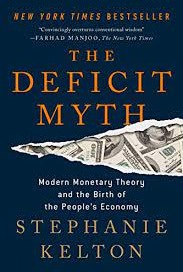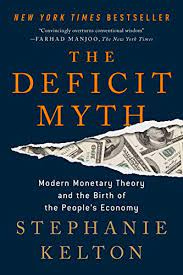If you pay attention to the news at all, you know that Treasury Secretary Janet Yellen said that we hit the Debt Ceiling on January 19th and that Treasury would begin using “extraordinary measures” to manage things until the crisis becomes unbearable this summer. If you read those reports carefully, you understand that the Debt Ceiling is an arbitrary limit set on total government borrowing. The challenge is that obligations already incurred through prior legislation will push us past the current limit, so the Debt Ceiling must be raised. It is a matter of Fiscal Policy (set by legislation) so it requires congressional action to raise the limit.
This creates our current crisis. Republican leadership in the House says that they won’t support an increase in the Debt Ceiling unless the White House and Democrats agree to spending cuts (as of yet unidentified). They claim (wrongly, more below) that we must respond in the same ways families respond when they are over budget: reduce their expenses1 and not ask for an increase in their credit card limit.2
Far too much of the news coverage has avoided the weakness of the family budget analogy, focusing instead on the political wrangling between the parties. They see that as a much better story (and easier to report) than a deep dive on why the Debt Ceiling must be raised to avoid disrupting US and Global economic concerns.
There are some speculations about what impacts a default of the “full faith and credit” of the United States would have. But these get couched in nebulous terms (global catastrophe) that are hard to get one’s head around.
It’s no surprise that the public is confused by this conversation.3 Natalie Jackson, research director at the Public Religion Research Institute, had an excellent piece in the National Journal this week. Polling, as one would expect, mirrors the confusion in the public.
That brings me to polls on the debt ceiling and how a debt-ceiling debate might impact perceptions of the various actors involved in raising the debt ceiling. A Yahoo News/YouGov poll last week asked several questions about the debt limit. The most striking finding is what people don’t know. To start with, fewer than half of those surveyed knew the purpose of the debt ceiling (42 percent), a quarter said it was to authorize new spending (it is not), and a third said they weren’t sure. With that background, the poll asked whether the debt limit should be raised—no other information given. By a 40 percent to 28 percent margin, Americans oppose raising the debt limit (the remaining third aren’t sure).
Last week I tuned into Chris Hayes’ show on MSNBC. He wasn’t there that night and Ali Velshi filled in. On a segment dealing with the Debt Ceiling, he interviewed Stephanie Kelton, economics professor at SUNY-Stony Brook and former staffer for the Senate Finance Committee. That conversation — which prompted me to get and read her book — introduced me to Modern Monetary Theory.
I’m not an economist and I only read her book once, so consider this my disclaimer for stuff I get wrong. But here’s what I think I understand.
In the post-World War II era, the US was part of the Bretton Woods System which committed us (and other countries) to manage our currency within 1% of the gold that backed it up. In August of 1971, President Nixon suspended dollar convertibility. From that point on, the dollar was untethered from actual “things”.
This is a very big deal to Kelton. Once that happens, then the US (and Japan and Great Britain) are Sovereign Currency Issuers. This sets us apart from countries (like those in the EU) who have to tie their local currency to some external value (and are therefore Currency Users). The US dollar can be printed under the auspices of the Federal Reserve.4
The Fed has responsibility for Monetary Policy — how much money is in circulation and in what fashion. When they create new funds, those are sold as Notes and Bonds — purchased by individuals, retirement funds, or foreign entities who find the dollar the best worldwide currency. Those new funds aren’t offset by anything — that’s where the wall street bailout came from.5
You may know that the Fed's twin charges are to minimize inflation and unemployment. Actually, those charges are contradictory. As we have seen in the last year, the Fed has increased base interest rates in an attempt to cool the economy. But the downside risk of doing too much on that end is to slow economic growth and increase unemployment. Thankfully, unemployment remains low while underemployment remains a bit more of a concern. It seems that interest rate control wins in ties, regardless of the harm done to individuals and families in the process.
The Fed isn’t free to do just whatever it wants. It is constrained by Fiscal Policy — those stipulations that Congress puts on budgets and borrowing. So if the Congress approves a Debt Ceiling of $XXX dollars, the Treasury or the Fed cannot exceed that level (even though Congress has passed already legislation which does so).
The clear solution is for Congress not just to raises the Debt Ceiling but eliminate it altogether. It serves no purpose in terms of spending controls, as the spending involved has already been committed.
Congress has the constitutional authority to set the federal budget that outlines expected revenues and expenditures over a particular time period.6 Kelton argues that under MMT, we shouldn't think of tax revenues as being the resources underwriting the expenditures. That's being done by the expansion of the money supply from the Fed into the broader economy.
What, then, is the point of taxes if not to fund programs? Kelton argues that paying taxes back to the government is a principal brake that keeps the economy from overheating. She agrees that inflation is a real problem that impacts real people and circumstances (as the last year has shown us).
If tax revenue isn’t the funding source,7 what should guide our Fiscal Policy decisions? It's often said that budgets are moral documents. You can tell where priorities are by where we spend our money. Kelton affirms this point enthusiastically. If we have under-resourced care for the elderly, inner city poverty, a shift toward a cleaner climate, or the creation of jobs that will support a living wage, it's not because we didn't have the money but because we chose not to.
I’m going against my better judgment and giving Congress the benefit of the doubt. I’m pretty sure many of them don’t know much about Bretton Woods or Nixon’s change or the way the Fed works. I would imagine that if given the YouGov poll Natalie Jackson references, their opinions would be similar.
As long as they remain in thrall of the household budget metaphor and fail to recognize the Fiscal Policy options they have, we’ll continue to have quixotic fights over budgetary windmills.8
There’s much more to Stephanie Kelton’s book9 and I may have glossed over significant pieces of her argument. And many of my economist friends will dislike this entire approach. But this is the first economic book I’ve read (there haven’t been many) that really aligns with what sociologists would like to see in terms of Fiscal Policy and Monetary Policy that truly benefitted “the general welfare”.
Families can also fix their budget by looking for new revenue through an additional part-time job but that’s new income is never part of the Republican analogy.
Another problem with their analogy — if I have good credit (as the US does), the credit card company asks regularly if I want to increase my credit limit, sometimes just doing so without me asking.
The Republicans actually prefer for the public to be confused.
She make clear that this is a loose way of talking about it. The Fed doesn’t actually print anything, they just make adjustments to their overall spreadsheets crediting some accounts and debiting others.
The Fed managed the funds in its monetary role with the congress (reluctantly) approving the 2008 stimulus package. It’s also where the funds came from for the Trump tax cuts and the Covid Response bills.
Kelton observes that some of those time limits are themselves arbitrary creations of Fiscal Policy such as the rule that new expenditure can’t add to the deficit within a 10 year window. While legislators have lots of workarounds to solve those PayGo (or SpendGo, as the House wants), they could just as easily pass legislation doing away with the ten year mandate.
She does make clear that family budgets, state budgets, and municipal budgets are all sustained by currency users so that income drives expenditures. But the federal government, as a currency issuer, is not so constrained.
Especially since the Republican’s stated goal for decades has been for government to do less than it does — hence their never-ending fights over “entitlements”.
It is remarkably readable with very limited charts and no equations or regression models to be found.





I also read the book, it is great and highly recommended.
In my opinion monetary theory is akin to voodoo. Our economic system is predicated on continuing growth on a finite planet. banks manufacture some 90% of our money through loans--there's not enough money in the system to repay all the loans and interest.
Every dollar loaned out will be used to purchase services and goods that require energy and materials that ultimately derive from the Earth. So, these ever-growing, manufactured dollars will ultimately deplete the planet. The biosphere is collapsing as I type. Some people suspect we passed peak oil in 2018-19.
We actually need structured de-growth, some geoengineering, and a return to small, localized economies to have any hope. This will not happen, because it will require cooperation on a global scale and decreased production of goods.
Let me close by mentioning two wise folks. Tim Garrett pointed out the civilization is a heat engine. So as we run the engine will indeed heat the planet. Al Bartlett pointed out that the human mind's inability to grapple with the exponential function was a serious problem. These gentlemen are correct.
Most economists worry not about thermodynamics and ecology. I guarantee that the markets will not grow indefinitely. I am 66 and I believe there's a decent chance I'll get to see the collapse.
As always John your essays are thought-provoking and a blessing! Thank you.